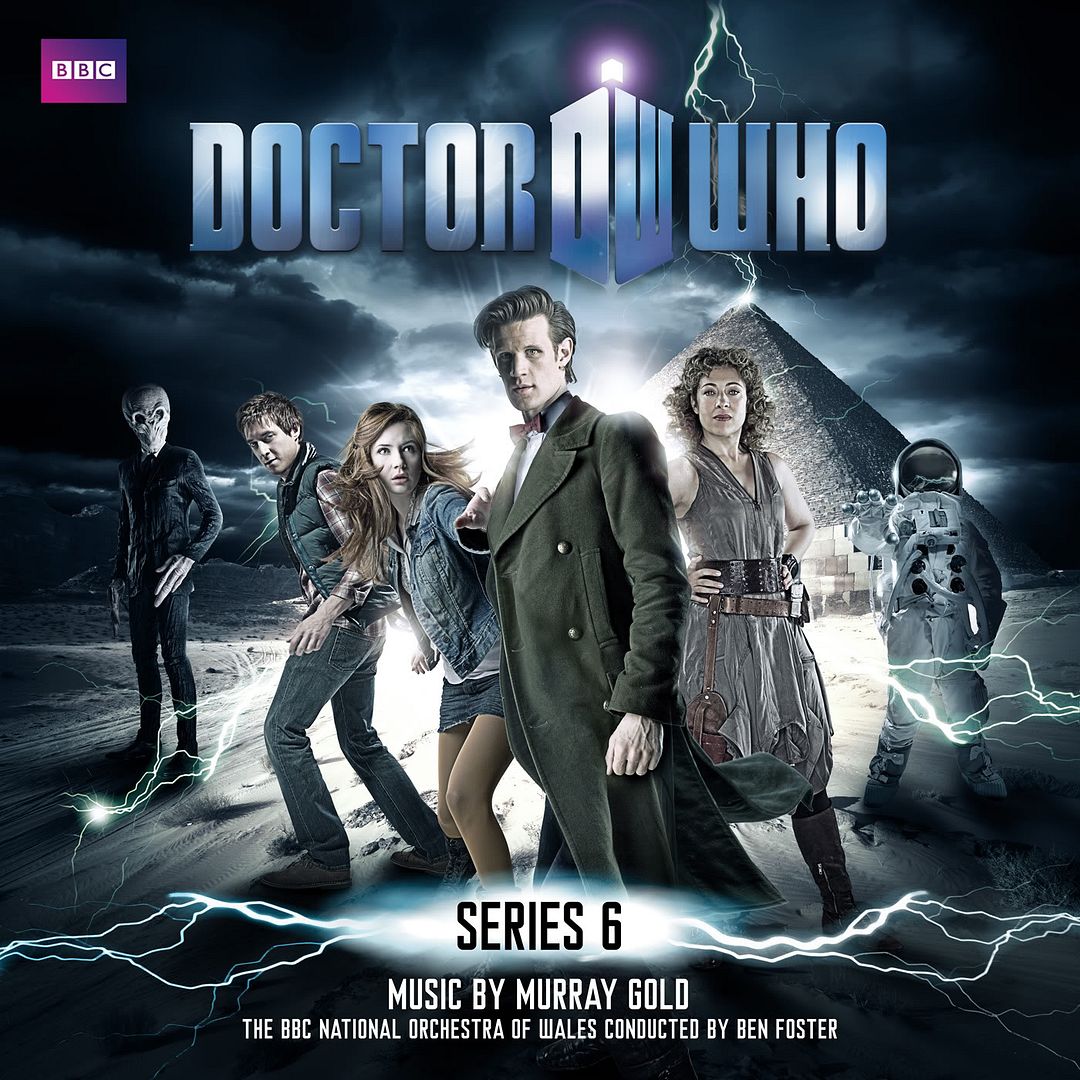BBC Radiophonic Workshop - 21
Various Composers
(Tony Askew, John Baker, Desmond Briscoe, Malcolm Clarke,
Delia Derbyshire, Maddalena Fagandini, Brian Hodgson,
Peter Howell, Paddy Kingsland, Roger Limb, Dick Mills,
Keith Salmon, Richard Yeoman-Clark, Phil Young)
The BBC Radiophonic Workshop were always pioneers, sculpting sound from whatever they could lay their hands on at the time, and assembling it with miles and miles of tape. They were so far ahead of their time in 1958, that we’re arguably still catching them up in some ways.
They were also square pegs in the BBC machine. Aunty Beeb never seemed quite sure what to do with this ever-changing collective of jazz musicians, engineers, avant-garde composers, former continuity announcers, and other boffins - labouring away, creating impossible sounds sequestered in their studio at Maida Vale. Their status within the BBC was seen more as problem-solvers than musicians, so recognition from Top Brass as composers and innovators was never really forthcoming. Unusual sounds, and unusual methods were only part of the issue, the BBC at this point still had yet to figure out how to commercially exploit its product beyond overseas sales.
Even the Workshop’s approach to celebrating anniversaries was unusual, BBC Radiophonic Workshop - 21 is a 21st anniversary collection, originally released by BBC records in 1979. Records compiling some of the Workshop’s highlights had begun to surface in the early 70s, but this one, re-released by Silva Screen, was their first true retrospective collection.
The first half covers the ‘found sounds’ era of the Workshop - a collection of themes, interval signals, and sound effects. It opens with the ominous reverberations of Workshop founder Desmond Briscoe’s sting from Quatermass and the Pit - followed without warning by Dick Mills’ outrageous Bloodnock’s (sic) Stomach sound effect from The Goon Show. These opening tracks set the listener up for what follows. Briscoe’s contributions drop off as time goes by, but his presence is still felt. His sinister musique-concrete piece Stick Up is truly menacing. Mills stayed the course at the Workshop, and remains an integral part of their current touring set-up to this day. His contributions can’t be underestimated, and are fed throughout the album. His Fanfare sounds like it should be Alex’s radio alarm in A Clockwork Orange, while Martian March Past sounds like the Clangers mobilising for war.
All the tracks are short, designed to order for TV and sometimes radio, they don’t hang around. It’s slightly jarring at first to listen to as an album, but it doesn’t take long to adjust. Everything here is strikingly inventive, and although each of the 45 tracks is brief, there’s more sonic ingenuity, humour, and personality at work in these brief pieces than some artists manage in a whole career.
Delia Derbyshire’s work dominates the first half. Her seminal original arrangement of Ron Grainer’s Doctor Who theme (paired with Brian Hodgson’s famous TARDIS dematerialisation effect) needs no introduction. Delia’s other work such as Know Your Car (where she turns a car’s ignition into a rhythm track), Talk Out (a collage of voices) and Great Zoos of the World (made using real animal noises) also sparkles and zings with otherworldly invention. Over the course of the 60s, she seems to push the envelope further and further towards ‘out there’.
The other female ‘voice’ here, Maddalena Fagandini, has a very different sensibility, contributing charmingly plinky pieces based around signals and patterns - including Time Beat, later reworked as a single by a pre-Beatles George Martin under the alias of Ray Cathode. Amongst others, the first side also features John Baker’s bottle-chorale Choice, and his eccentrically catchy Hardluck Hall.
At the turn of the 1970s, staff turnover and new technology heralded a new era, as the closing track of the original side one - Dudley Simpson’s berserk synthesised cues for The Mind of Evil (realised on the Workshop’s new ‘Delaware’ Synthesiser), proves.
The second half is a collection of work from the synth era of the 1970s, featuring the work of Paddy Kingsland, Roger Limb, Malcolm Clarke, and Richard Yeoman-Clark. Kingsland’s work is instantly recognisable, he’s perhaps the member of the Workshop with the most distinct style - melodic, florid, and somewhat languid. A Whisper From Space and Newton would both slot seamlessly into any of his Doctor Who scores of the 80s.
Yeoman-Clark gets just the one track, Mysterioso - a bit of atmosphere from Blake’s 7, which, although synthesised, is very much in the spirit of Derbyshire’s questing electronica, and Briscoe’s abrasive stings.
Malcolm Clarke’s Hurdy Gurdy, meanwhile, is unmistakably the product of the same mind between the nerve-shredding music from The Sea Devils - but his nondescriptly-named BBC-2 Serial is rather pretty.
Peter Howell’s Merry-Go-Round and The Secret War echo Maddalena Fagandini’s 60s work in their well-constructed melodic plinkiness. Howell tends to go to town more with layers and sounds, but it’s his Greenwich Chorus that’s the real stand-out - a choral piece with vocoders, which sounds like something a more focused early 70s Brian Wilson might have written.
Limb’s contributions are more variable. Swirley is cheesy synth-calypso, and Quirky is not so much quirky, as a bit annoying. On the other hand, The Plunderers is rather catchy, sounding not unlike the wonky Farfisa Organ-led indie pop of Metronomy, and his closing For Love Or Money is a sort of Third Man theme for synths.
This is 45 tracks of impossible sounds and the everyday twisted into new shapes, foreshadowing synth-pop, dance music, and the art-rock adventures of Bowie, Eno, and Visconti in Berlin. It’s the sound of mathematical precision meeting rampant creativity, perspiration, overheating synthesisers, cigarette smoke, and pressing deadlines. The Radiophonic Workshop are still going, at a boutique festival near you. Long may they bleep.
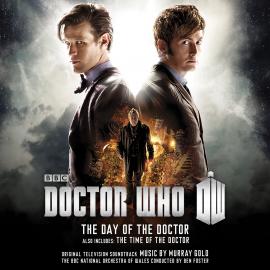
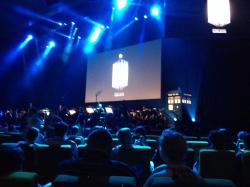
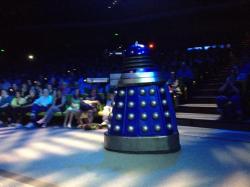 It wasn’t all about Matt Smith though. The Classic series was well represented too. Of course, hosting the concert was Peter Davison, the Fifth Doctor, or Doctor 005 as he called himself. He was immediately charming, relaxed, funny and clearly enjoying himself. Throughout the evening, he slipped in witty asides about his time as the Doctor, and engaged in some cheeky repartee with Foster that at one stage involved a cricket bat, a bunch of celery, and a score for Earthshock – The Opera. Davison wasn’t the only Classic Doctor to have a presence. Via the marvels of pre-recorded video, the wonderfully barmy Tom Baker featured in two segments speaking directly to the audience, and there was also the nostalgic ‘Classic Doctor Who Medley’, with music from all seven Classic Doctors. Most memorable though were the groovy 60’s sounds of The Tomb of the Cybermen and the evocative score for City of Death.
It wasn’t all about Matt Smith though. The Classic series was well represented too. Of course, hosting the concert was Peter Davison, the Fifth Doctor, or Doctor 005 as he called himself. He was immediately charming, relaxed, funny and clearly enjoying himself. Throughout the evening, he slipped in witty asides about his time as the Doctor, and engaged in some cheeky repartee with Foster that at one stage involved a cricket bat, a bunch of celery, and a score for Earthshock – The Opera. Davison wasn’t the only Classic Doctor to have a presence. Via the marvels of pre-recorded video, the wonderfully barmy Tom Baker featured in two segments speaking directly to the audience, and there was also the nostalgic ‘Classic Doctor Who Medley’, with music from all seven Classic Doctors. Most memorable though were the groovy 60’s sounds of The Tomb of the Cybermen and the evocative score for City of Death. 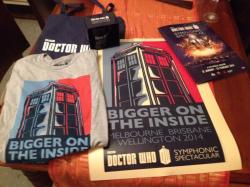 Apart from the thrills and emotions of the live music, the other exciting element was – naturally – the presence of aliens and monsters roaming the auditorium and the stage. Like last time, this included Silurians, Cybermen, the Silence, the Ood, Vampire Girls, Judoon and of course the Daleks, playing it up with Foster as they took over the hall. But new and welcome additions included the new Cybermen from Nightmare in Silver, ther impressive presence of Ice Warrior Skaldak from Cold War, and the Whisper Men from The Name of the Doctor.
Apart from the thrills and emotions of the live music, the other exciting element was – naturally – the presence of aliens and monsters roaming the auditorium and the stage. Like last time, this included Silurians, Cybermen, the Silence, the Ood, Vampire Girls, Judoon and of course the Daleks, playing it up with Foster as they took over the hall. But new and welcome additions included the new Cybermen from Nightmare in Silver, ther impressive presence of Ice Warrior Skaldak from Cold War, and the Whisper Men from The Name of the Doctor. 